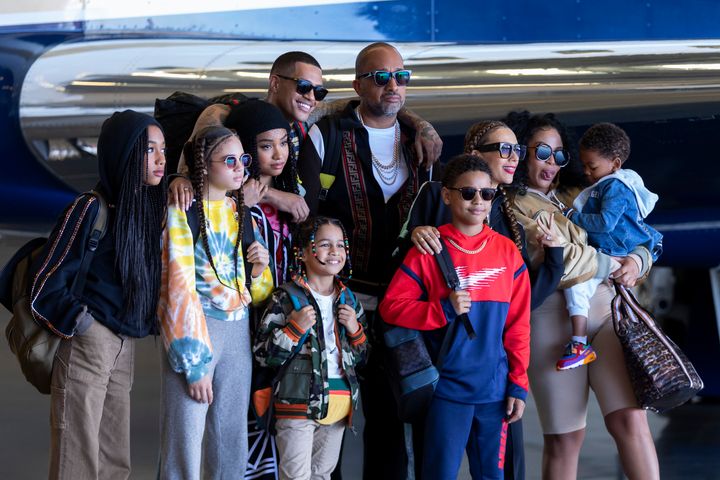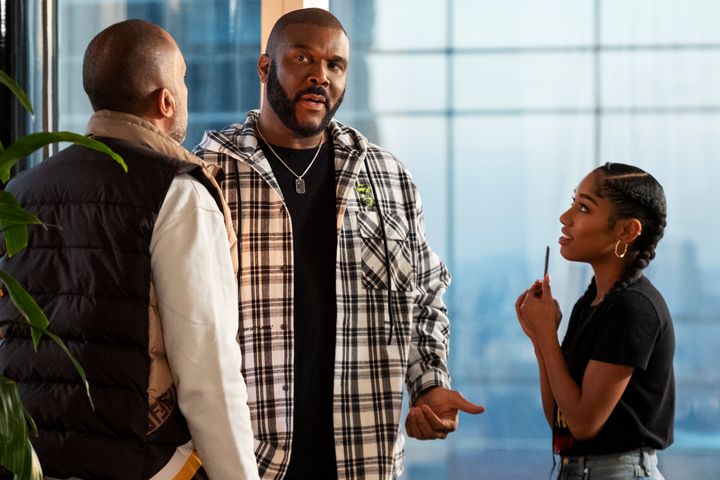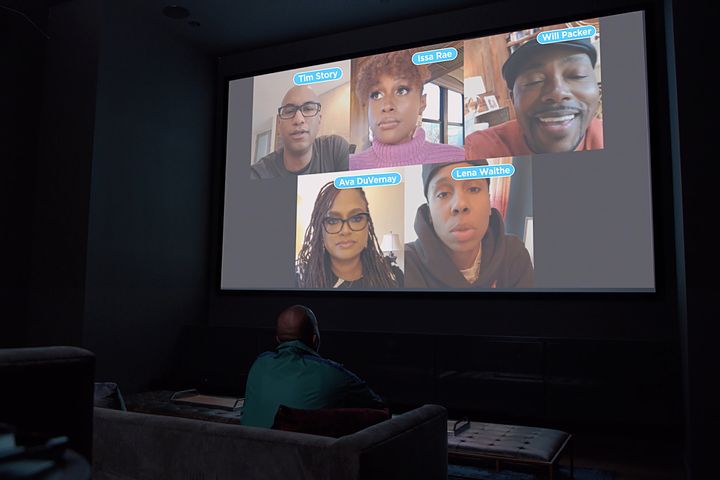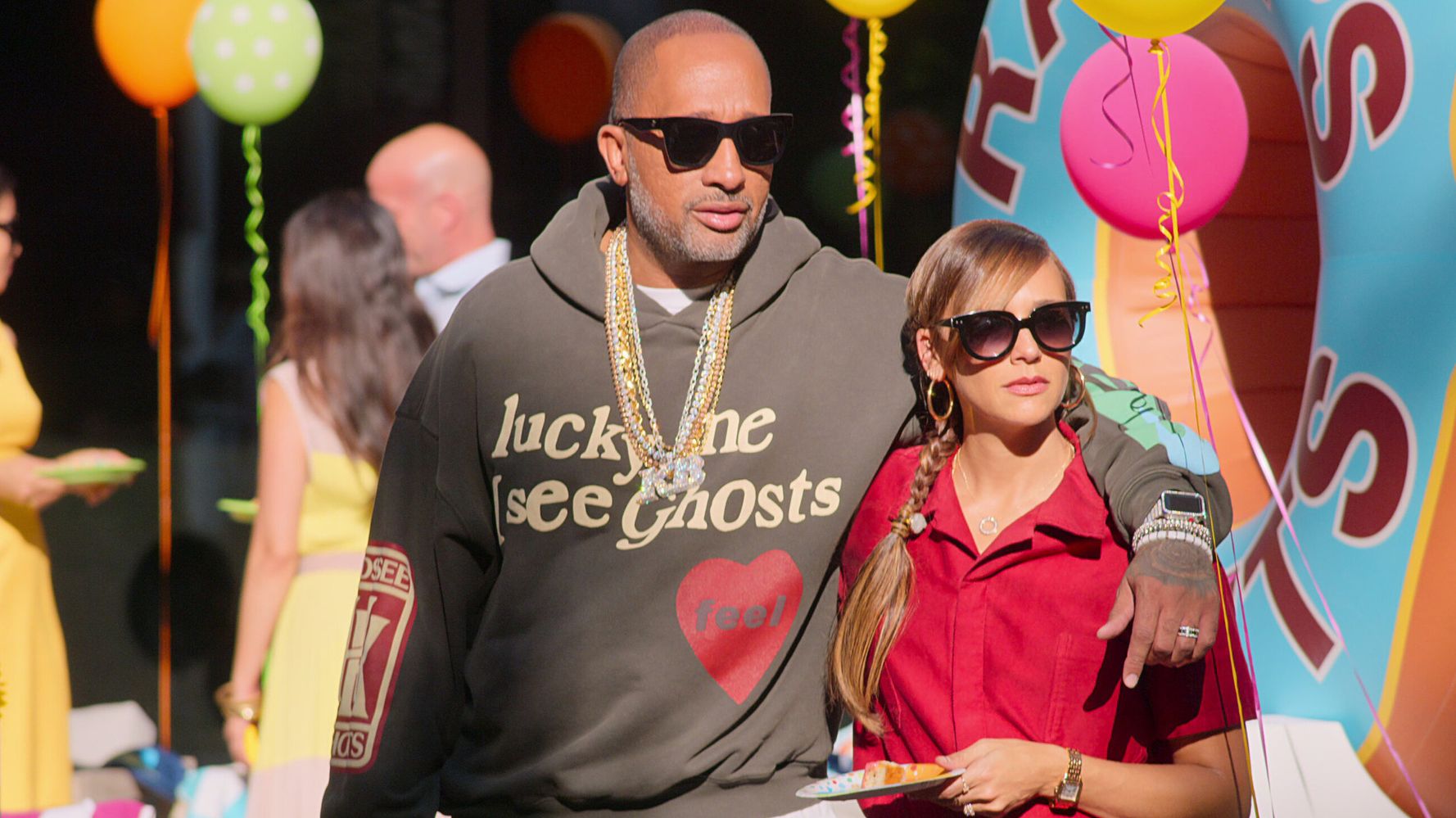[ad_1]
Kenya Barris’s new Netflix show, “#blackAF,” is like “black-ish” reloaded.
The satirical eight-episode series premieres Friday and is loosely based on Barris’s life as a dad. But “#blackAF” stars the writer-producer as an exaggerated version of himself who is married to Rashida Jones, and together they are raising a highly dysfunctional, superrich family.
The story is told from the perspective of their daughter Drea, portrayed by Iman Benson, who’s shooting a documentary for her application to New York University’s film school. She captures her parents referring to their kids as thots and assholes on occasion, rolling on molly at a music festival and often arguing over who’s the best parent.
It’s a hilarious hot mess with plenty of cringe-worthy moments.
But it’s not all crass language and choices worthy of calling child protective services over. Each episode — and episode title — dedicates time to explaining why everything that happens today in America is related to slavery, a theme that mostly works but can feel like a heavy-handed explanation at times. The show also features delightful cameos from Black celebrities playing extended family and friends, including Nia Long, Mike Epps and Kim Whitley.
Episode 5, which features guest spots from Tyler Perry, Issa Rae, Ava DuVernay, Will Packer, Lena Waithe and Tim Story, is a standout. It addresses the often touchy topic of the proper way to critique Black creators in Hollywood, especially given that so few of them have influence and opportunity.
“The only way we’re gonna keep ourselves in the conversation is to really police each other,” Barris’s character says at the end of the episode. “Because we’re, right now, in this thing where white people aren’t going to be honest with us. They’re either gonna celebrate us publicly because that’s what’s hip right now or secretly behind closed doors wait for our demise, so we have to sort of tell each other the truth.”
When the trailer premiered in early April, this episode felt even more relevant as social media users criticized Barris for making, what they believe, is a redundant version of “black-ish.” They said Barris showed colorism in casting the entire family, who, with the exception of Benson, are all light-skinned actors, an accusation the producer has faced before with his other shows.
Barris spoke to HuffPost about criticizing Black art, making a Black satire and whether or not we’ll finally see the NFL episode of “black-ish.”

How’s life social distancing and quarantining with this new reality we have?
Kenya Barris: It’s OK. I think I’m getting sort of crazy. I have a really close friend who is having a really rough time, so that’s the first thing. So it’s affecting everybody every day now. I’m sure you’re hearing how the virus is affecting our community because of socioeconomic conditions and things like that. But everything’s delayed, so it’s hitting home.
We went from these jokes of, “Oh, Black people can’t get it” to now we’re just seeing how catastrophic it is for us. It’s just something new every day.
Oh, I know, and I think it’s going to affect us even more moving forward. You and I do have our jobs, fortunately. People who now are going on three, four weeks being out of work, well most Americans can’t deal with that. The impacts of that, I’d say, are quite scary.
It really is. Fortunately, we have a few avenues of levity, for what that’s worth. I enjoyed a little level of escapism with “#blackAF.” And I know that you discussed it being inspired by your life as a dad and your family. We see a little glimpse of inspiration from your home life through “black-ish,” so I’m wondering, why this show?
I would say I think I only have one story to tell. [Laughs] But no, I really do enjoy the family story part of sitcoms. One of the things that I feel happens in most shows — whether it be “Modern Family” or “black-ish” or “Everybody Loves Raymond” or even “The Cosby Show” — I think that it makes us closer to people. Everything basically starts at home, all the lessons and stuff that we’ve been taught, it really starts at home. And so, seeing how that happened is really important to me.
When I left ABC to go to Netflix, I knew I wanted to do the family show that I wanted to do when I was at ABC, which was a higher dysfunctional family. I cannot tell you how many more lessons we’ve learned from our failures and successes as parents. There was no version of being able to do the network version of that. You don’t want to fix what’s not broken, but I do think it was time for a different tread on the tire of family sitcoms.
I really enjoyed the fact that it was a satire because I don’t think we see enough Black satire on screen.
I agree. Spike Lee is one of my people who sort of got me going. I enjoy social commentary, which also often comes into the form of satire when you put it into a comedic form. And I wanted to have it portray a part of the world that we know exists around us every day, but we’re not able to sort of talk about. And so I think that was the best way to sort of present it as a family satire.
One thing that I thought was funny and smart — and I feel like would be definitely obvious to black viewers but white viewers may be, like, “Oh, what the hell is going on?” — is the fact that every episode mentions and relates something back to slavery. Why is that important for the show?
That so much of our behavior that people outside of, and even inside of, our culture look to sort of mock and have furrowed brows and have lots of comments on, they don’t understand that it’s the people doing more than anyone could expect of us considering what we came from.
It’s still very much in our DNA. We’re always fighting against it. And some of those things make us stronger and everything that makes us the amazing people that we are today, but they still present in our behaviors. I actually thought about naming the show “Because of Slavery” because I think so much of what we do is linked back to that atrocity that we endured.

Those traumas can still be very much felt even when, as we were talking about earlier, we’re being disproportionately affected by coronavirus, that is because of slavery. I’d never seen it on a comedic platform where it’s done in the way you’ve done it, so I thought that was interesting.
That means a lot. Free thought [in comedy] is under attack right now. And so the idea of sort of trying to say something different ― and not say it’s because it’s provocative or because it’s an actual feeling ― is really scary. You never know if that filming is going to be the thing that ends up being the end of your career.
So having those things and knowing that it’s going to be recorded and broadcast back out to the world is really, really, really scary. But some … of my heroes would be the people who said, “You know what? I don’t give a fuck. I’m going to say what I feel and I’m going to leave it up to conversation.” And though some of those may start some conversation. And that’s really some of those things that people were just saying because, really, in some aspects, I mean it may sound hyperbolic, it’s changed the world.
Richard Pryor, he’s my hero. He was, of course, a flawed hero, but so much of what he did and so much of the self-deprecating and the things that he talked about pulled the curtain back on us as a people, and to white Americans, on them. It really sort of changed the conversation, and still most of the comedy 40 years later, it’s derivative of what Richard Pryor is doing there. And Dave Chappelle we’re seeing does that, and I think that it’s really important to be able to try and say some things that might start a conversation to hopefully lead to a more productive place.
Episode 5 discusses how we criticize subpar work by Black creators and whether we do it publicly or among ourselves. Where’s the line between rooting for everybody Black and critiquing our art in an honest and constructive way that pushes it forward?
Yeah. And why does everyone have to have the same opinion? Why does everything Black have to be for everyone? We’re not monolithic as a people; we strive to really not be seen that way, so why do we do it in our art? We’re nascent in the world of film and television. We got into the game late. And so the only way that we ever will elevate ourselves is to maybe externally celebrate it because we know we need to show up for one another, but at least internally we can have conversation.
Internally, we can’t have debate? Internally, we can’t speak honestly to one another so that when we step into our next project we see things a little bit differently and maybe take some of those conversations to heart.
At the same time, I respect and I understand that different people have different experiences that have shaped their life in different ways. The media and critics have been really kind to me. Even when they were not being kind to me, they’d been fair. And so it’s like you can’t draw some of it and take others. I think I’ve taken all of that, aggregated it into what it means to me and how I can sort of grow from it.
What is your response to people who critique your casts for consisting of mainly lighter-skinned Black people?
I think this particular show, for me, it’s based on my family. My kid’s mother was biracial. And the same thing with “blackish.” I wanted to have those people reflect what this family would actually look like. I think throughout my career I’ve worked with and done so many different things, and I think the whole notion of it is I’m not going to go and start just hitting like, “When I did this, when I cast this person…” That’s ridiculous.
But I do think the idea of it is I wanted to do as much as I can, and I’ve been a big, big, big advocate of representation. All my career has really been about is making sure that we get seen ― and get seen in a certain way. And I feel like the more projects that I do, the more representation I will continue to show. I definitely have gotten into conversations and rebuttals and things like that. I feel like everyone’s experiences are different, and they’re valid and they should be able to express it, and I respect it.
I do feel like this is my family, and I feel like I do want these characters to be seen as Black, once again in the same way, I don’t want us to be divisive.

In Episode 5, a few other Black Hollywood writers and directors chime in to check your character, and it shows how the Black Hollywood tribe holds each other down. I’m wondering what that support system looks like?
Well, I think it’s everything. We have not seen a time like this ever in terms of that tribe being stronger. And I feel, more importantly, the thing that I’m seeing is we’ve not seen a time like this in terms of that tribe being more supportive of one another. All those people came on and did that for nothing, and were really busy and made time. It was out of love for the culture and other art.
The real thing is we need more of us, and we need enough of us to sort of spread the love and throw it back out, and I think we have to open the doors for one another.
One last thing real quick. Will we ever see the NFL episode of “black-ish”? Is that a possibility?
I would love for that. I think if ABC were smart, especially during this time for… I would love to tell Dana and those guys to air it. It’s all done now. We need… Actually, when I hang this phone, I’m going to call Dana. [laughs] And, I’m so serious. Is there a version of the episode that could be aired? That would give something similar or a real piece of content ― especially right now it’s a really smart idea.
Calling all HuffPost superfans!
Sign up for membership to become a founding member and help shape HuffPost’s next chapter
[ad_2]
Source link

